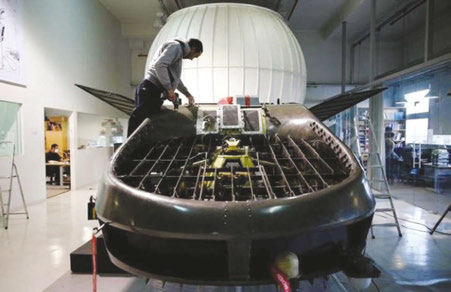
The Cormorant, billed as a flying car, is capable of transporting 500kg (around half a tonne) of weight and travelling at 185 km (115 miles) per hour. It completed its first automated solo flight over terrain in November. Its total price is estimated at $14 million. (Reuters)
After 15 years of development, an Israeli tech firm is optimistic it will finally get its 1,500 kg (1.5 tonne) passenger carrying drone off the ground and into the market by 2020.
The Cormorant, billed as a flying car, is capable of transporting 500kg (around half a tonne) of weight and travelling at 185 km (115 miles) per hour. It completed its first automated solo flight over terrain in November. Its total price is estimated at $14 million.
Developers Urban Aeronautics believe the dark green drone, which uses internal rotors rather than helicopter propellers, could evacuate people from hostile environments and/or allow military forces safe access.
“Just imagine a dirty bomb in a city and chemical substance of something else and this vehicle can come in robotically, remotely piloted, come into a street and decontaminate an area,” Urban Aeronautics founder and CEO Rafi Yoeli told Reuters.
Yoeli set up the company, based in a large hanger in Yavne, central Israel, in 2001 to create the drone, which he says is safer than a helicopter as it can fly in between buildings and below power lines without the risk of blade strikes.
There is still plenty of work required before the autonomous vehicle hits the market.
The Cormorant, about the size of a family car and previously called the ‘Air Mule’, is yet to meet all Federal Aviation Administration standards and a test in November saw small issues with conflicting data sent by on board sensors.
With 39 patents registered to create the vehicle, Yoeli has little concern about competitors usurping him.
One industry experts said the technology could save lives.
“It could revolutionise several aspects of warfare, including medical evacuation of soldiers on the battlefield,” said Tal Inbar, head of the UAV research centre at Israel’s Fisher Institute for Air and Space Strategic Studies.
Source: Reuters





Be the first to comment